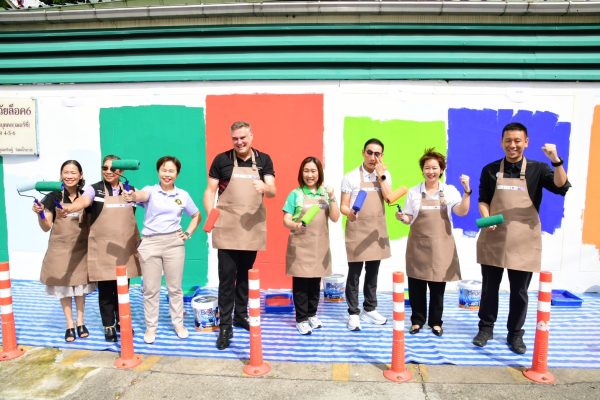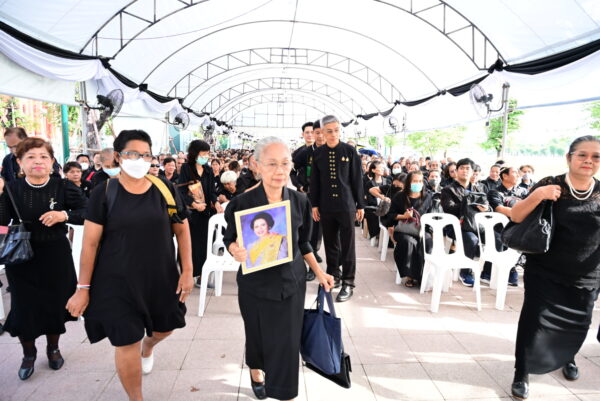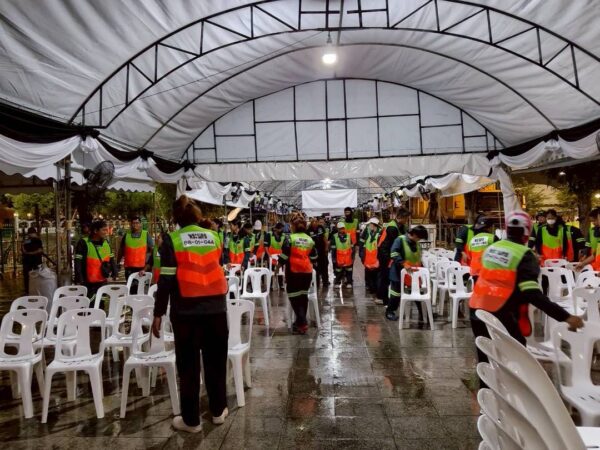(July 4, 2025, 9:00 a.m.) – The Bangkok Metropolitan Administration (BMA) has launched the “Safe Schools, Free from Fire Hazards with Innovations from Food Waste” project, introducing a new fire retardant made from food waste shells.

Bangkok Deputy Governors – Assoc. Prof. Tavida Kamolvej and Sanon Wangsrangboon – participated in the event at the HDF Mercy Centre in Khlong Toei district.
Sanon explained that the project addresses three key areas simultaneously: safety, food waste reduction, and child development.
He elaborated, saying, “In fact, early childhood care involves two main components. The first is the school environment, which the BMA can fully support as it is a government area, and we can allocate funds to develop it.”
“The second part involves daycare centres, mostly located within community areas, where we cannot allocate government funds for development as they are privately run.”
However, Sanon said that the BMA is fortunate to receive cooperation from numerous private partners. He noted that the HDF Mercy Centre, which cares for many children, has some facilities that require improvements.
“When our partners contacted us, we immediately thought of this place. There are many other places that also need help. Personally, I feel very grateful and thank all the partners who have joined us in this effort,” he added.
BMA, in collaboration with Bangkok Marriott Marquis Queen’s Park Hotel, the Ministry of Higher Education, Science, Research and Innovation (MHESI), the National Science and Technology Development Agency (NSTDA), the National Nanotechnology Centre (NANOTEC), and Beger Group, has launched the “Safe Schools, Free from Fire Hazards with Innovations from Food Waste” project.
This initiative brings together government, private sector, and community efforts to utilise innovations from organic waste to enhance safety at the HDF Mercy Centre in Khlong Toei district.
The project stems from the concept of reducing organic waste at the hotel, particularly oyster shells discarded from the Goji Kitchen + Bar buffet, which amount to as much as one tonne per month.
Through a systematic waste management and separation process, the hotel has been able to pass on these materials to the research team for efficient development.
Dr. Chutiparn Lertvachirapaiboon and his team of nanomaterials researchers (RNM) and researchers specialising in responsive materials and nanotechnology sensors (RMNS), supported by the National Research Council of Thailand (NRCT), have processed the oyster shells into calcium carbonate, which is used as a precursor for producing nano-calcium phosphate. This material can be prepared in both solid powder and liquid forms.
An example of the application of nano-calcium hydrogen phosphate is its ability to disperse in water for spraying on surfaces requiring fire-retardant properties. The material has passed UL94V-0 testing standards and can extinguish flames within 10 seconds without any flame dripping.
The project has also received support from Beger Group, who have analysed and tested the substance to develop it into “fire-retardant paint” made from food waste oyster shells for household use.
This marks the first time in Thailand that such a product has been developed for use on buildings, adding value to waste and benefiting vulnerable communities.
At today’s event, Simon Bell, General Manager of Bangkok Marriott Marquis Queen’s Park Hotel; Dr. Uracha Raktanonchai, Director of NANOTEC under NSTDA; Dr. Worawat Chaiyosburana, CEO of Beger Group; executives from HDF Mercy Centre, BMA, Khlong Toei District Office, and other relevant stakeholders participated in the launch.
———-




